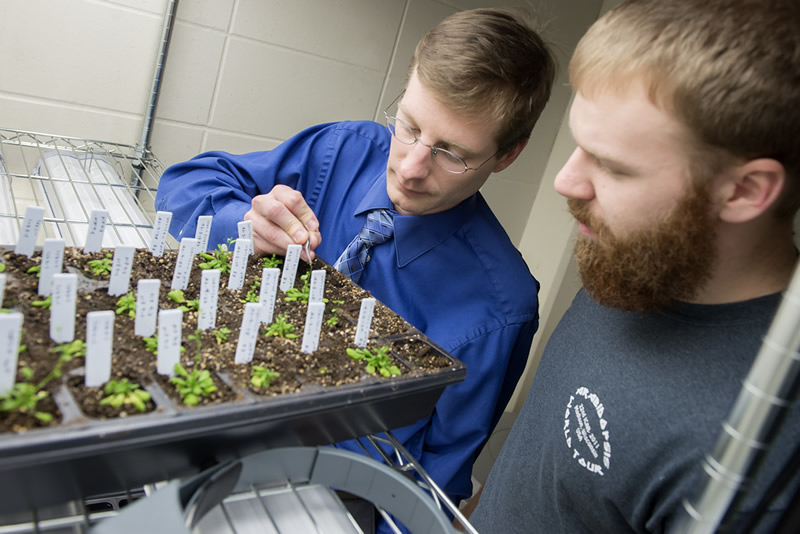EAU CLAIRE — Dr. Derek Gingerich, an associate professor of biology at the University of Wisconsin-Eau Claire, has received a three-year $214,510 grant from the National Science Foundation to continue a faculty-student collaborative research project related to how plants respond to light.
The research project, “RUI: Analysis of Mutants Identified in Screens for Suppressors or Enhancers of a Red Light Hypersensitive E3 Ubiquitin-Ligase Mutant,” developed from Gingerich’s previous research, which was also funded by an NSF grant in 2009, that studied how plants respond to light. Gingerich and his team of student researchers will build on the previous work involving the role of two specific genes — LRBI and LRB2 — in plants’ light response; specifically to red wavelength light.
This research has important implications for the agriculture industry, Gingerich said.
“Plants with disruptions of the two identified genes are, among other things, more shade tolerant,” Gingerich said. “This project will provide new insights into the mechanisms by which plants respond to their light environment.
“Shade responses are important in agriculture, as shading can reduce agronomic performance by increasing lodging (falling over), decreasing yield and reducing plant defenses to pathogens and pests. The information obtained in this project may help guide future work on light responses in crop plants.”
Funds from the grant will be used for conference travel expenses, laboratory supplies and student salaries. Gingerich will employ three students during the academic year and two during the summer. Students will be given subprojects to work on and will conduct most of the research with guidance from their professor.
“This is a great opportunity for undergraduate students,” Gingerich said. “First, it allows them to figure out if research is something they want to pursue as a career or in graduate school. Second, conducting research extends classroom learning by allowing students to apply basic knowledge to real research. It provides them with an understanding of how to handle adversity and keep the project moving even after experiencing setbacks.”
The opportunity to attend professional conferences also gives students the chance to network with faculty members from graduate schools and current graduate students, providing valuable contacts that may help them in the future, Gingerich said.
Biology major Gavin Sunde, a senior from Madison, has been conducting research with Gingerich since his freshman year. Being a part of a long-term research project has been a rewarding experience, Sunde said.
“I started this project by selecting the plants to study, and now I’m at the completion of identifying specific genes that are important to understanding plant light responses,” Sunde said. “It has been so rewarding to make discoveries and observe interesting behaviors. I love conducting research and plan to go to graduate school after I graduate in May.”
Gingerich said receiving the NSF grant to continue his work on plant light response has meant a great deal to him, and he credits the UW-Eau Claire Office of Research and Sponsored Programs for their assistance in handling the logistics of submitting a grant proposal.
“ORSP helped immensely with writing the proposals and filling out the application forms accurately in order to be considered for this grant,” Gingerich said. “Receiving the grant is significant because it allows me to maintain a research program that is so beneficial for our students. As an educator, it’s important to be an active researcher and keep abreast of information. Conducting research also allows me to participate in advancing my field.”
For more information about Dr. Derek Gingerich’s research on plant light response or the NSF grant, contact him at 715-836-4415 or gingerdj@uwec.edu.

Dr. Derek Gingerich (left) and Gavin Sunde (right) continue NSF funded plant light response research.

Gavin Sunde (left) and Dr. Derek Gingerich (right) extract plant proteins to analyze response to red wavelength light.
UW-Eau Claire News Online
Find UW-Eau Claire news online at www.uwec.edu/news. You’ll find recent and archived news releases, links to other campus news, upcoming events, a news tips submission form, news media resources and more.
